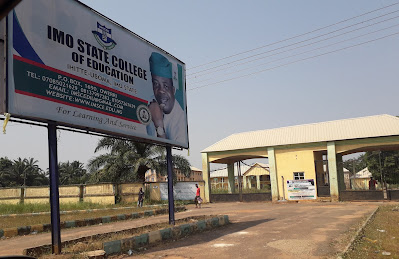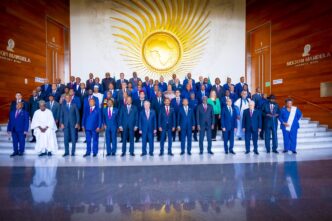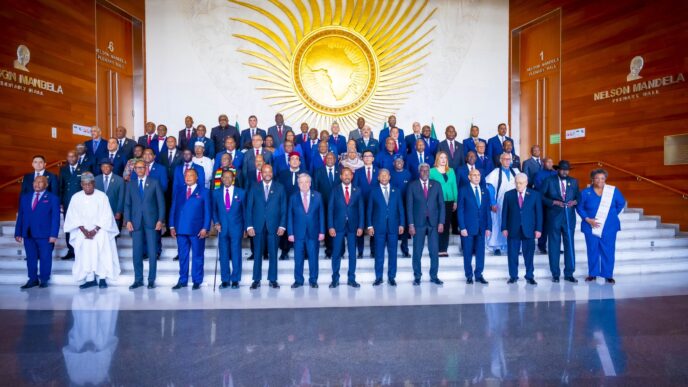BY MUBARAK UMAR
Nigeria is on the cusp of a transformative digital revolution, and the recent partnership with Google could be the catalyst needed to position the country as a global leader in artificial intelligence (AI) and digital innovation.
Last week, President Bola Ahmed Tinubu initiated a strategic partnership with Google CEO Sundar Pichai in Paris, France, focusing on five key areas: enhancing scalable cloud infrastructure, equipping the workforce with essential digital skills, fostering AI innovation and research, promoting cloud adoption, and elevating Nigeria’s standing in the global digital economy.
This collaboration aligns with the President’s Renewed Hope Agenda, which prioritises economic diversification through industrialisation, digitisation, and innovation. With strategic oversight from the Federal Ministry of Communications, Innovation, and Digital Economy, and implementation spearheaded by the National Information Technology Development Agency (NITDA), Nigeria is poised for a transformative leap into AI and digital innovation.
Google’s partnerships have played a crucial role in accelerating digital transformation in various countries. In India, the Google for India Digitisation Fund pledged $10 billion to support digital inclusion, AI research, and cloud expansion, leading to increased smartphone penetration and financial inclusion. Similarly, in Rwanda, Google collaborated with the government to provide digital skills training and AI-driven solutions for agriculture and healthcare. These success stories highlight the potential impact of Google’s partnership with Nigeria, positioning the country as a frontrunner in Africa’s AI and digital transformation journey.
Advertisement
Also in South Africa, Google’s investment in cloud infrastructure and digital skills training has empowered businesses and individuals, contributing to the country’s growing tech ecosystem. Additionally, Google’s AI research initiatives in Kenya have focused on developing tools for African languages, demonstrating the potential for Nigeria to leverage similar collaborations to address local challenges.
Moreover, Google’s AI research initiatives in the United States and Europe have fostered an ecosystem where startups and tech enterprises thrive by utilizing cloud-based AI tools and Google’s AI research labs. Nigeria’s integration into this global digital economy could lead to the emergence of its own AI-powered startups, research hubs, and innovation clusters, further cementing its role in the global technology space.
Nigeria’s vibrant startup ecosystem, with technology hubs across the country, is a fertile ground for innovation. The partnership with Google can provide resources, mentorship, and access to global markets through Google’s advanced AI capabilities and expertise.
Advertisement
For example, a Large Language Model (LLM) for Nigerian languages could revolutionise education, healthcare, and communication by enabling access to information in local languages. Google’s previous collaborations, such as its work with researchers in Kenya to develop AI tools for African languages, demonstrate the potential for Nigeria to leverage similar partnerships to create impactful solutions.
Furthermore, this collaboration will enhance AI research institutions, providing Nigerian researchers and innovators with access to Google’s extensive resources, and facilitating the development of AI-driven applications that address national challenges such as healthcare, agriculture, and financial inclusion. AI-powered diagnostic tools can improve disease detection rates, smart agriculture solutions can boost food security, and AI-driven financial services can enhance economic accessibility for underserved populations.
Cloud computing is the backbone of digital transformation, and this partnership seeks to enhance Nigeria’s cloud infrastructure to support government and private-sector initiatives. With the growing demand for data storage and computational power, Google’s investment in cloud services and data centres will provide a robust foundation for businesses, startups, and public institutions to thrive in a digitally driven economy.
Kashifu Inuwa, CCIE NITDA’s director-general, has emphasised the importance of local data centres to ensure data security, compliance, and resilience in the face of global digital disruptions. The integration of off-grid, green energy-powered data centres will further contribute to sustainability while unlocking new economic opportunities.
Advertisement
A strong cloud infrastructure will not only facilitate AI research and big data analytics but also drive digital government initiatives, including e-governance, smart city projects, and digital identity management. This, in turn, will improve service delivery, enhance national security, and promote transparency in governance.
A skilled workforce is essential for harnessing the benefits of AI and digital technologies. Nigeria’s youthful population, with a median age of 18, represents a significant asset in this regard. However, there is an urgent need to equip this demographic with the digital skills required to thrive in the 21st-century economy. Google’s initiatives, such as the Google for Africa programme, have already trained millions of Africans in digital skills, and this partnership could expand such efforts in Nigeria.
This partnership which aims to embed digital literacy into the education system—from primary schools to tertiary institutions, can create a talent pipeline capable of driving innovation and attracting global investments. Programmes focused on AI, machine learning, cloud computing, and data analytics can empower Nigerians to participate in the global digital economy.
Cloud adoption is essential for businesses to remain competitive in the digital age. This partnership can empower Nigerian businesses, particularly small and medium-sized enterprises (SMEs), to streamline operations, reduce costs, and access global markets. Google’s experience in helping countries like Indonesia and Brazil adopt cloud solutions can serve as a model for Nigeria’s digital transformation.
Advertisement
For instance, in Indonesia, Google’s cloud infrastructure has enabled businesses to scale rapidly, contributing to the country’s growing digital economy. Similarly, in Brazil, Google’s initiatives have helped SMEs adopt digital tools, driving innovation and economic growth. By replicating these successes, Nigeria can create an enabling environment for businesses to thrive in the digital era.
Google’s global network and resources can help Nigerian startups access international markets, attract funding, and scale their operations. Initiatives like Google for Startups, which has supported entrepreneurs in countries like Egypt and South Africa, could be expanded to Nigeria, providing mentorship, funding, and technical support to local innovators.
Advertisement
The partnership between Nigeria and Google represents a transformative step toward establishing the country as a global leader in AI, cloud computing, and digital innovation. Nigeria can bridge the digital divide, empower businesses, create employment opportunities in the digital economy, and define Nigeria’s role in the Fourth Industrial Revolution.
With the right policies, strategic oversight, and a commitment to digital excellence, Nigeria is set to reap immense benefits from this historic collaboration, paving the way for a more inclusive and technologically advanced future.
Advertisement
Umar writes from Abuja
Advertisement
Views expressed by contributors are strictly personal and not of TheCable.
Add a comment











